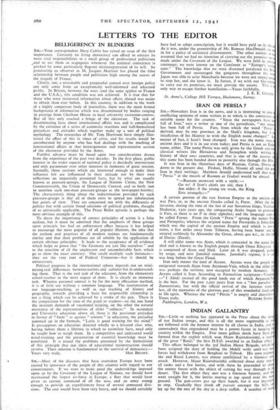LETTERS TO THE EDITOR
BELLIGERENCY IN BLINKERS
Sm,—Your correspondent Mary Cubitt has raised an issue of the first importance. Certainly no living democracy can afford to entrust its most vital responsibilities to a small group of professional politicians .and to use them as scapegoats whenever the national conscience is pricked by some particularly flagrant misinterpretation of its will. So penetrating an observer as M. Jacques Maritain has placed the false relationship between people and politicians high among the causes of the tragedy of France.
Clearly, too, a reasonable and purposeful control over foreign policy can only come from an exceptionally well-informed and educated ptblic. In Britain, between the wars (and the same applies to France and the U.S.A.), this condition was not achieved. It is true that for those who were interested information about affairs abroad was easier to obtain than, ever before. In this country, in addition to the work of a highly competent body of journalists, there was the more formal background of information which was disseminated by bodies ranging in prestige from Chatham House to local university extension-centres. But all this only reached a fringe of the electorate. The task of disseminating facts about international affairs was and is complicated by the existence of a series of automatic reactions and half-formulated prejudices and attitudes which together make up a sort of political mythology The researches of Mr. Tom Harrisson have simply illus- trated the effect of this in times of crisis, and his results would be corroborated by anyone who has had dealings with the teaching of international affairs in that heterogeneous and representative section of the electorate provided by the Army.
Further advance must be based upon two considerations drawn from the experience of the past two decades. In the first place, public interest in the wider aspects of national policy is decidedly intermittent and only paramount over other interests in moments of great tension. Secondly, those sections which are interested enough to make their influence felt are influenced in their attitude not by their own reflections on impartially presented facts, but by what are usually known as pressure-groups, the League of Nations Union, the New Commonwealth, the Union of Democratic Control, and so forth (not to mention such one-man pressure-groups as the newspaper-barons). The characteristic thing about the indoctrination provided by such pressure-groups is that all of them exist to spread not information but points of view. They are concerned not with the differentia of politics but with certain broad solutions of political problems, thought of as universally applicable. The Peace Ballot episode is perhaps the most obvious example of this.
To decry the importance of correct principles of action is a false realism, but it must be admitted that the emphasis of these groups upon principle has had an unfortunate effect because it has helped to encourage the most popular of all popular illusions, the idea that the outlook and practices of all modern nations are fundamentally similar and that their problems are all soluble by the application of certain obvious principles. It leads to the acceptance of all evidence which helps to prove that "the Germans are just like ourselves" and to the rejection of all the unpleasant and uncomfortable facts which go to show the exact contrary. One could multiply such instances— they are the very root of Federal Unionism—but it should be unnecessary.
Political progress in the international sphere depends not on mini- mising real differences between nations and cultures but in understand- ing them. That is the real task of the educator, from the elementary school-teacher to the most august of dons. It is clearly an immense task. Whereas personal contact is by far the most efficacious method, it is of little use without a common language. The reorientation of our language-teaching, as well as our teaching of history and geography, towards providing a basis for responsible citizenship is not a thing which can be achieved by a stroke of the pen. There is the competition for the time of the pupil or student—on the one hand the insistent demands of vocational training, on the other the natural resistance of the representatives of older "subjects." In secondary and University education above all, there is the persistent prejudice in favour of " form " as against " content " in education, the prejudice summed up in the formula, "Latin is good training for the mind."
It presupposes an education directed wholly to a leisured class who, having before them a lifetime in which to assimilate facts, need only be taught how to weigh them. In a competitive and unleisured world mind-training and the presentation of essential knowledge must be combined. It is round the problems presented by the formulation of this principle that our ideas of educational reconstruction should revolve. Their solution is fundamental to the survival of democracy.— ,


























 Previous page
Previous page